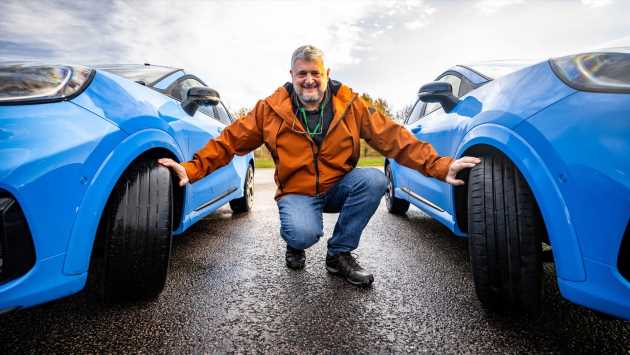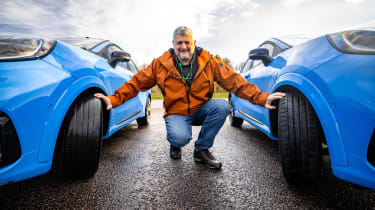Worn tyres vs new tyres test: what are you risking by delaying tyre replacement?
Drivers are delaying new tyre purchases, but our test reveals the risks involved
A shocking 39 per cent of drivers say they only replace a worn tyre if it fails an MoT, while 27 per cent admit to waiting ‘several months’ to replace a tyre that’s been issued with an MoT advisory warning. Even more worrying are the 11 per cent of drivers who receive an advisory warning about a tyre’s condition and say they’ll delay replacing it until the tread fails the next MoT.
The alarming statistics are from online retailer eBay, which has conducted market research that shows one in 10 drivers have delayed the purchase of new tyres at some point in the last three years due to financial pressures. The figures suggest an alarmingly high number of vehicles are driving on sub-optimal tyre treads – often less than the 1.6mm of a barely legal tyre.
But if you’re thinking of saving a few quid in the festive season by putting off the purchase of a new set of tyres, think again. Courtesy of eBay, we took part in a dramatic demonstration on a test track of the dangers of worn – but still legal – rubber, when compared with new replacements.
To demonstrate just how risky worn tyres can be – even when they’ve still got just enough tread to pass legal scrutiny – eBay took us to the wet handling area at UTAC’s Millbrook proving ground so we could compare the braking and handling of two identical Ford Pumas. Identical, that is, apart from one wearing a brand-new set of Continental SportContact 7s, while the other had the same tyres shaved to the legal minimum tread depth of 1.6mm.
With both cars equipped with telemetry, we could compare emergency braking distances from 70mph and 60mph to a stop on a wet surface. The results should be thought-provoking for anyone planning to ‘make do’ with worn tyres or ignore an MoT advisory warning for barely legal tread depth.
Data provided by the telemetry showed that from 70mph our emergency stopping distance on wet, cold tarmac was 60.7m on the new tyres, but that distance was extended by a heart-stopping 14.9m to 75.6m – equivalent to three-and-a-half car lengths in the Ford Puma – for the worn tyres. The car felt less controlled from the driving seat, too, with the stability control system working much harder to keep the Puma on course. The emergency stopping distance from 60mph was similarly compromised; on new rubber the car stopped in 42.6m, while on barely legal treads that distance extended to 55.1m.
This was a simple test, rather than analysis under scientific conditions. But all the same, if proof were needed that worn tyres significantly compromise safety, this demonstration did the trick.
Following the emergency stops, we also tried both sets of tyres through a coned chicane and around a circle. No data was recorded, but it was evident that grip was compromised on the just-legal tyres, with excessive understeer in the chicane, and an inability to get close to the tight constant-radius circle achieved on the new tyres.
eBay has just relaunched its tyre purchase and fitting service, an online system that allows you to input your tyre size, choose a seller’s offer on the tyres you want, then arrange for installation at a local tyre specialist where the tyres will be delivered.
“Like many necessary jobs, checking tyres, buying the right ones and getting them fitted can be a stumbling block for many motorists – and safety will be compromised as a result,” says Ian Faulkner, category manager for tyres at eBay UK. “The simplicity of eBay’s service ensures you can quickly and easily find the right tyres and a convenient place to have them fitted.”
Make sure you stay safe with brand-new rubber! These are the best tyres to buy right now…
Source: Read Full Article








